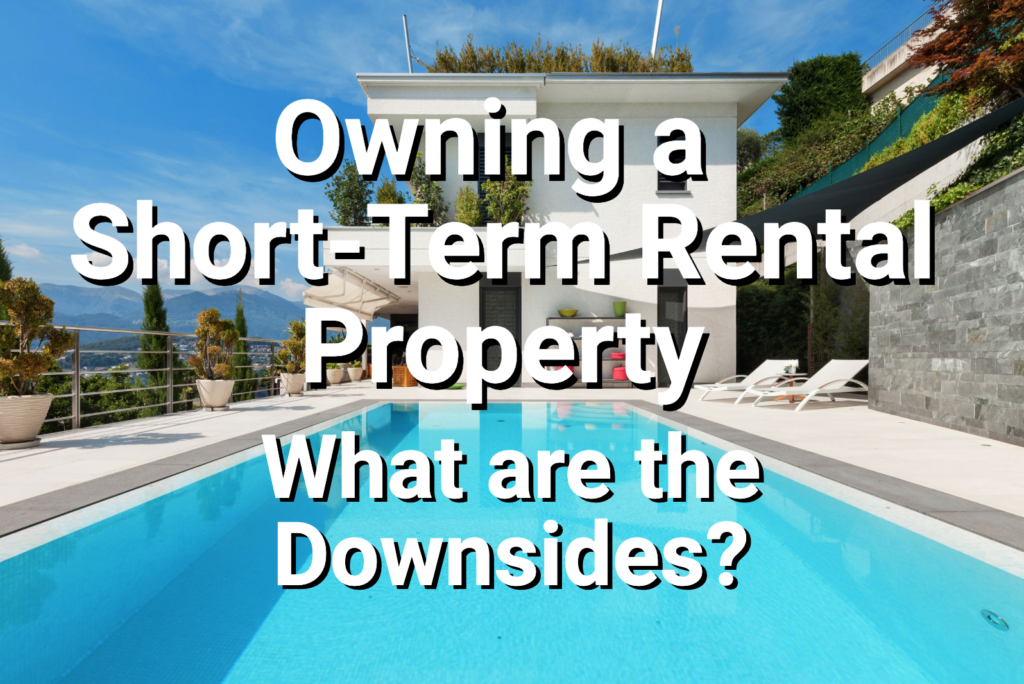Buying a short-term rental is becoming a popular option among property investors. In many cases, you can earn more annual profit with a short-term rental than a long-term rental, even if that short-term property is only rented for a portion of the year.
Owning a short-term rental like an AirBnB property sounds like a convenient, relaxing way to earn a steady income. Buy a place near the beach, place it on the appropriate sites, and watch the cash come rolling in by the barrel.
But it’s not that simple. Short-term rentals, while holding excellent potential for profit, bring major challenges. From dealing with new tenants every week to navigating complex local regulations, there will be plenty of challenges to occupy your time, create stress, and chew into your profits.
We’re not saying you should avoid short-term rentals. On the contrary, we’ve are simply saying that if you choose this potentially-lucrative path, you need to be prepared for the inevitable challenges.
The Challenges of Owning a Short-Term Rental
Dealing with Inconsistent Local Regulations
Sites that serve short-term rental, like AirBnB, grew quickly and brought many changes to the tourism and hospitality industry, as well as the real-estate industry. With obvious concerns, many local governments, such as city councils, enacted regulations in an attempt to control and reign in perceived issues with these properties.
The problem is that these regulations are disjointed, irregular, and inconsistent. In the United States, local municipalities have a major say on how a property can be used for short-term rentals. Some cities require that you register the property as a business, some require that you obtain a license with a vacation rental endorsement, and some say that the “host” (owner) must be present for a certain time.
The challenge becomes learning and following these regulations. This makes it extremely difficult to own properties in multiple towns, as keeping all the regulations in order can be tough.
Filling the Property Weekly or Monthly Becomes a Challenge
With longterm rental properties, you are generally renting the property for at least a year; in some cases you may have a tenant that stays for decades. With short-term rentals, you are looking at new “tenants” (“guests” would likely be a more accurate term), every week or two.
This means a lot more work on your part. You have to advertise, contact potential renters, collect downpayments, and prepare the house for new guests more frequently. This can add a lot of work, and well as more financial costs, to short-term rentals.
Guests May Treat Your Property Like a Party House

Short-term rentals are, essentially, vacation homes. This means that people, in general but not always, treat your home as a place to party, live it up, and (sometimes) go wild. Essentially, people have less interest in maintaining your property because they’ll be gone in a few weeks, which can mean far more high-cost repairs and maintenance.
This challenge can rarely be completely eliminated, but it can be reduced. For every guest, there should be a clear contract that outlines what is expected of them and what the potential penalties could be if the home is abused or damaged.
Property May Only be Rented Seasonally
Depending on where your property is located, it may only be rented out during a short portion of the year. For example, if you own a lake-side cottage in northern Michigan, you’ll likely have lots of potential renters during the warm summer. Groups of friends and families may be flocking to your property, bringing a steady stream of income. But once fall sets in, demand declines. You may have the occasional autumn angler and winter snow-mobile group, but demand will probably drop sharply.
When you own a typical rental property, the home will be rented all through the year, but the same can’t be said for a short-term rental.
Short-Term Rentals Need Tourism, Tourism Depends on a Positive Economy
Short-term rentals are basically a luxury, not a necessity. People don’t need to go on vacation, or at the very least, they don’t need to go on an expensive vacation and spend thousands of dollars on lodgings. When the economy is rolling, unemployment is low, and investment accounts are churning out profits, it’s easy (for some) to justify spending $10,000 on a weeklong stay at a beach house. But when the economy slows, people need to tighten their financial spending and eliminate luxuries; the tourism and vacation industries often suffer when the economy slows, which means you could be stuck with a property that is not earning cash; it could actually be losing money if your property is mortgaged.
With long-term rentals, there is far more consistency in income and greater stability from economic fluctuations. People need a place to live even when the economy is at a slowdown, which means you’ll have a steady supply of potential tenants, regardless of economic factors.
Dealing with Competition While Remaining Profitable
Over the past decade, we have seen a massive growth in available properties for rent. This growth has led to a high level of competition among property owners, which means you may have to drop your prices in order to attract short-term tenants.
Competition is, of course, an important part of our overall economic system. But you need to be ready to respond to this competition and potentially lower your rates, all while maintaining profitability with your short-term rental.
Find Top-Quality Financing for Your Short-Term Rental Purchase
If you are considering a short-term rental as an investment property, having the right mortgage can make a major difference on your profitability. The wrong mortgage could drag down your potential success, so talk with our staff and we’ll help you find the right loan for your specific needs.
Whether you want to reduce monthly payments with a long-term loan, or pay it off quickly with a 15-year mortgage, we can show you all the available options so you can make an informed decision.


